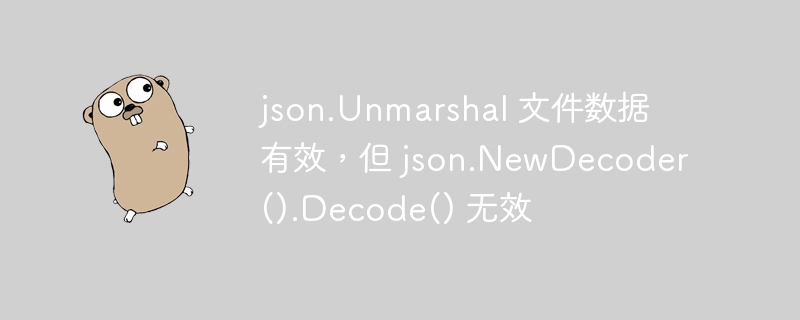 Backend Development
Backend Development
 Golang
Golang
 json.Unmarshal file data is valid, but json.NewDecoder().Decode() is invalid
json.Unmarshal file data is valid, but json.NewDecoder().Decode() is invalid
json.Unmarshal file data is valid, but json.NewDecoder().Decode() is invalid

php editor Strawberry will introduce you to a problem about JSON parsing. Sometimes we encounter a situation where using json.Unmarshal to parse file data is effective, but using json.NewDecoder().Decode() is not effective. This problem may occur in the code logic or data format. Below we will analyze the possible causes in detail and provide solutions.
Question content
The following correctly unmarshals the structure:
func foo() {
d, err := os.readfile("file.json")
var t t
if err := json.unmarshal(d, &t); err != nil {
panic(err)
}
}But this doesn't work and throws a bunch of classic json parsing errors, i.e. eof, unexpected token 't', etc.
func foo() {
f, err := os.open("file.json")
var t t
if err := json.newdecoder(f).decode(&t); err != nil {
panic(err)
}
}Do you know why? os.file or []byte is used in two goroutines at the same time. The json structure is as follows (some fields are omitted):
{
"data": [
{
"field": "stuff",
"num": 123,
},
...
]
}Solution
os.File or []byte Use in two goroutines at the same time...
This is where the problem lies. os.File has an internal file pointer where the next read occurs. If two unrelated entities continue to read data from it, they may not read overlapping data. Bytes read by the first entity are not repeated in the second entity.
Additionally, os.File is not safe for concurrent use (the documentation does not explicitly state that it is safe): calling its methods from multiple concurrent goroutines may cause data races.
When you pass []byte to multiple functions/goroutines that "read from", there are no shared pointers or index variables. Each function/goroutine will maintain its index separately, and it is OK to read variables from multiple goroutines (in this case fields of the slice header and slice elements).
The above is the detailed content of json.Unmarshal file data is valid, but json.NewDecoder().Decode() is invalid. For more information, please follow other related articles on the PHP Chinese website!

Hot AI Tools

Undresser.AI Undress
AI-powered app for creating realistic nude photos

AI Clothes Remover
Online AI tool for removing clothes from photos.

Undress AI Tool
Undress images for free

Clothoff.io
AI clothes remover

AI Hentai Generator
Generate AI Hentai for free.

Hot Article

Hot Tools

Notepad++7.3.1
Easy-to-use and free code editor

SublimeText3 Chinese version
Chinese version, very easy to use

Zend Studio 13.0.1
Powerful PHP integrated development environment

Dreamweaver CS6
Visual web development tools

SublimeText3 Mac version
God-level code editing software (SublimeText3)

Hot Topics
 Go language pack import: What is the difference between underscore and without underscore?
Mar 03, 2025 pm 05:17 PM
Go language pack import: What is the difference between underscore and without underscore?
Mar 03, 2025 pm 05:17 PM
This article explains Go's package import mechanisms: named imports (e.g., import "fmt") and blank imports (e.g., import _ "fmt"). Named imports make package contents accessible, while blank imports only execute t
 How to implement short-term information transfer between pages in the Beego framework?
Mar 03, 2025 pm 05:22 PM
How to implement short-term information transfer between pages in the Beego framework?
Mar 03, 2025 pm 05:22 PM
This article explains Beego's NewFlash() function for inter-page data transfer in web applications. It focuses on using NewFlash() to display temporary messages (success, error, warning) between controllers, leveraging the session mechanism. Limita
 How to convert MySQL query result List into a custom structure slice in Go language?
Mar 03, 2025 pm 05:18 PM
How to convert MySQL query result List into a custom structure slice in Go language?
Mar 03, 2025 pm 05:18 PM
This article details efficient conversion of MySQL query results into Go struct slices. It emphasizes using database/sql's Scan method for optimal performance, avoiding manual parsing. Best practices for struct field mapping using db tags and robus
 How do I write mock objects and stubs for testing in Go?
Mar 10, 2025 pm 05:38 PM
How do I write mock objects and stubs for testing in Go?
Mar 10, 2025 pm 05:38 PM
This article demonstrates creating mocks and stubs in Go for unit testing. It emphasizes using interfaces, provides examples of mock implementations, and discusses best practices like keeping mocks focused and using assertion libraries. The articl
 How can I define custom type constraints for generics in Go?
Mar 10, 2025 pm 03:20 PM
How can I define custom type constraints for generics in Go?
Mar 10, 2025 pm 03:20 PM
This article explores Go's custom type constraints for generics. It details how interfaces define minimum type requirements for generic functions, improving type safety and code reusability. The article also discusses limitations and best practices
 How to write files in Go language conveniently?
Mar 03, 2025 pm 05:15 PM
How to write files in Go language conveniently?
Mar 03, 2025 pm 05:15 PM
This article details efficient file writing in Go, comparing os.WriteFile (suitable for small files) with os.OpenFile and buffered writes (optimal for large files). It emphasizes robust error handling, using defer, and checking for specific errors.
 How do you write unit tests in Go?
Mar 21, 2025 pm 06:34 PM
How do you write unit tests in Go?
Mar 21, 2025 pm 06:34 PM
The article discusses writing unit tests in Go, covering best practices, mocking techniques, and tools for efficient test management.
 How can I use tracing tools to understand the execution flow of my Go applications?
Mar 10, 2025 pm 05:36 PM
How can I use tracing tools to understand the execution flow of my Go applications?
Mar 10, 2025 pm 05:36 PM
This article explores using tracing tools to analyze Go application execution flow. It discusses manual and automatic instrumentation techniques, comparing tools like Jaeger, Zipkin, and OpenTelemetry, and highlighting effective data visualization





